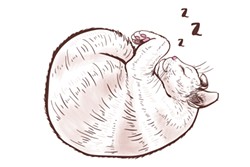Evenings, for many of us, are our favorite time of day. The work day responsibilities are over, and we can settle in to enjoy a big dinner, screen time or a book. The problem, however, is some of these admittedly fun activities can interfere with sleep. We may exercise and eat well, but ignoring sleep can undo many efforts to live a healthy and long life. Sleep affects every cell of the body and is crucial for our physical and mental health.
During healthy sleep, the body is cleaning out toxins, repairing cells, storing or erasing memories and surveying the body for potential problems. It's also important for our mental health: Poor sleep increases the risk for depression by 40 percent.
So don't let sleep troubles persist. Consulting a physician is important since some breathing disorders, such as sleep apnea, can be fatal if untreated. But for most of us, lifestyle changes are what's needed to give our bodies a better chance to get the rest we need. Here are two things to try if sleep is a struggle:
1. A common pattern is to eat very little breakfast, a small lunch and then a big dinner. This pattern often results in much daytime fatigue and feeling wide awake at bedtime. The body is getting its major fuel supply (food) at the exact wrong time of day. It's hard on the heart to be working on digestion when it should be resting. Spacing out the day's food with lunch being a bigger meal than dinner is ideal. It helps if the food choices are healthy.
2. The brain needs a "buffer zone" an hour or more before bedtime. This means no stimulating activity such as reading exciting stories, doing work or using computers, all of which can activate the brain. Give your body all the help you can to slow down before bedtime. Think of the calming rituals we use to prepare children for bed — a pleasant bedtime story and a kiss goodnight. This is a good ritual for the adult brain as well!
Robert Maurer is a Spokane psychologist, founder of the Science of Excellence consulting firm, and the author of several books, including One Small Step Can Change Your Life and Mastering Fear.


